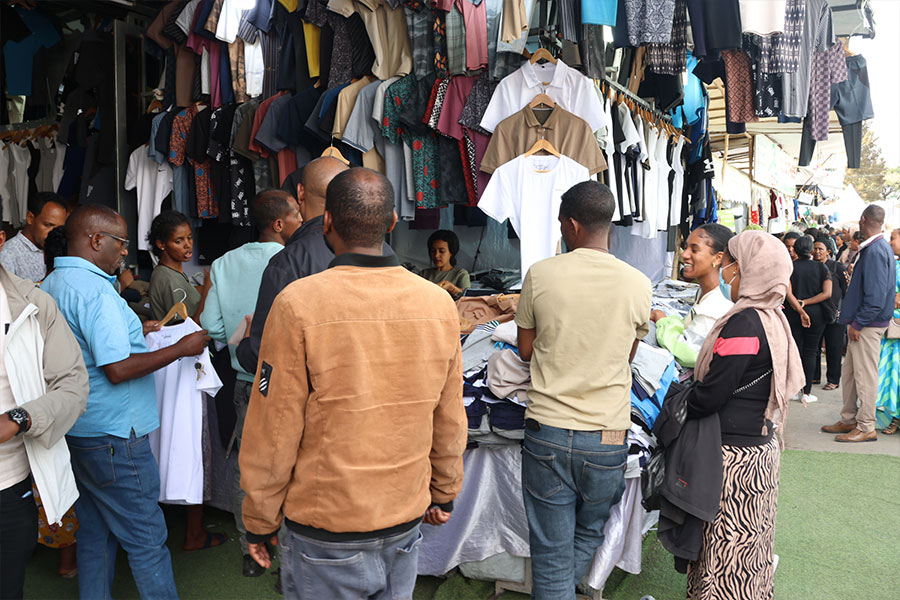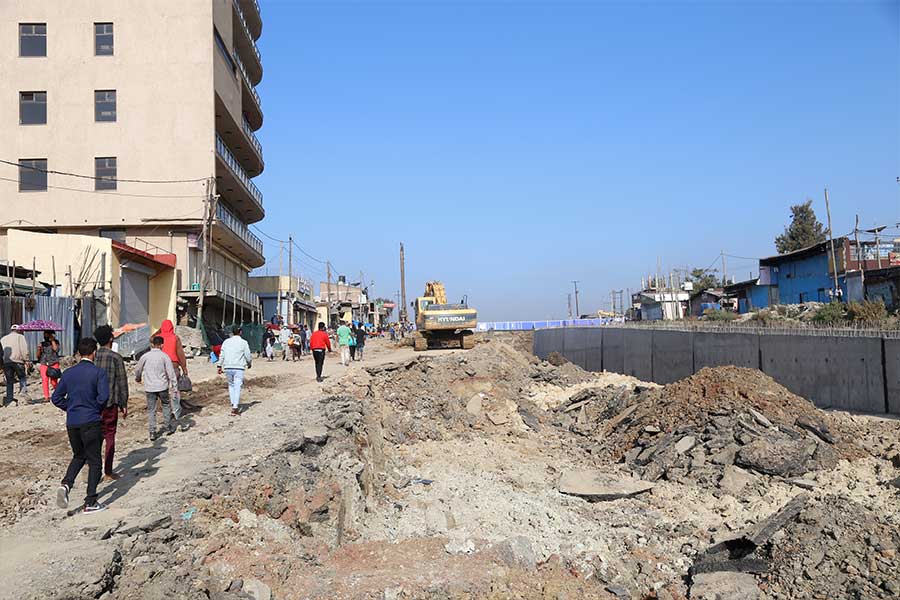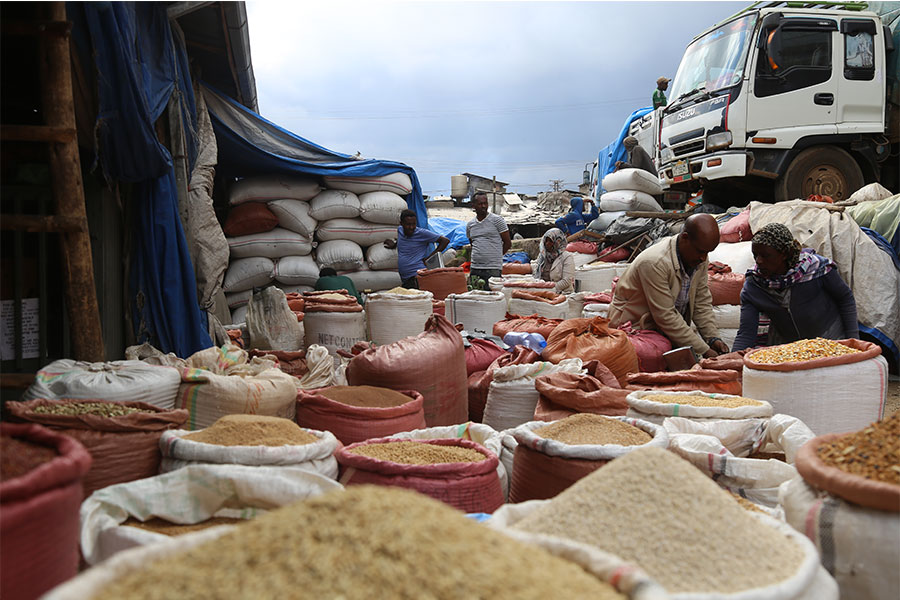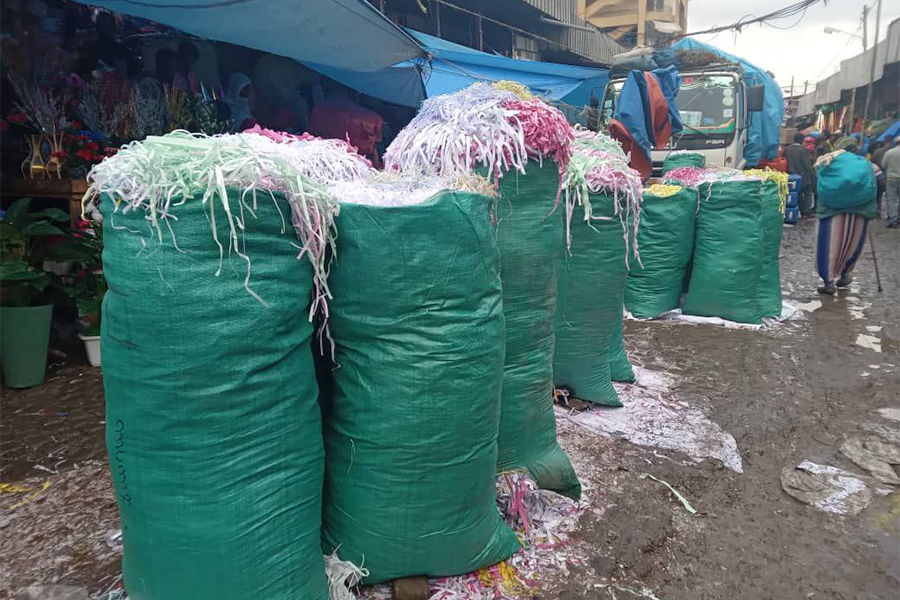
Birtukan Mekuria, 26, had high hopes of completing her holiday shopping on good notes as she roamed the Shola market earlier last week. She came to the market earlier to get an affordable deal with the 1,000 Br she had in her purse.
Carrying the two-year-old son on her back, she made a stop at one of the retailers looking to buy chicken and some onions, but the price had transcended her budget. She tried to bargain pleadingly for the trader to cut down the price of chicken to 600 Br from 800 Br to no avail. She went away disappointed.
"My kids were looking forward to this holiday," she told Fortune.
Birtukan lives around Addisu Gebeya in a one-room house, paying 1,500 Br monthly rent. She makes a living by putting the finishing touches on cultural scarves earning no more than four Birr on a daily basis. On other days she makes a living washing clothes.
"I barely make ends meet," she said.
The Shola market around the Addisu Gebeya area is in the holiday festivity. The sound of chickens clucking and buyers and traders arguing over the price made it appear busy.
Yohannes Birhanu, a chicken vendor, is standing in the middle of crowing roosters in a basket. He pulls out one and hands it to the prospective buyers with some speculating on the sizes and shapes and going away dissatisfied with the price. Long arguments over prices prevail, with customers trying to downsize the price as much as they can.
The price ranges from 800 Br to 1,200 Br for the ones making their way from Welayta town.
Yohannes, who started selling chicken last month, seems more than optimistic about the overall market. He claims to have sold 10 pieces that particular day.
"Business has been going great," he said.
A man has busied himself slaughtering chickens for buyers on the corner.
Tigist Kibret is one of the customers waiting patiently alongside her daughter as the chicken she bought is being slaughtered and cut into pieces, costing 50 Br extra.
"Taking the live one will be too much hustle," said Tigist.
The high costs have undoubtedly terrified more than a few shoppers. However, the section where chickens are sold appeared more lively than the other quarters.
Abebech Kassa has busied herself with organizing butter, a white cheese, and eggs she brought from Debre Berhan town a few days ago. An egg is sold for 12 Br, a kilo of white cheese for 150 Br and a kilo of butter is sold for 500 Br. Very few customers make their way to her corner. "I barely sold anything," Abebech told Fortune. The spice section suffers the same fate. Jemila Mohammed is sitting idly, engaged in conversation with the next-door vendor. No customer seems to come their way.She claims to hardly profit since the spice prices in the Merkato area where she purchases have upsurged. They argued the increase is due to rising import costs as one of the ingredients for the spice mix is shipped from abroad. Cardamom which was sold for 100 Br a kilo last year is now sold for 200 Br while the black seed has seen an increase in price by two folds.A spice mix often used for stews stands at 1,000 Br a kilo."We don't sell that anymore," Jemila said. A little over 11Km away, there are more than 16 cattle trading sites in the 13 woredas of the Nifas Silk district. Qera is a neighbourhood known for its cattle markets where over 14,000 bovine and more than 30,000 sheep are being sold. Fewer buyers than usual were in the area leaving abruptly after learning the price tags. The price for a sheep ranges from 11,000-27,000 Br depending on the size, doubled from the last holiday.
Beg tera at Qera seems to exhibit a vibrant holiday euphoria, with thousand of flock sheep dispersed in partitions. Idle traders are sitting around watching eagerly for customers to make their way.
Abera Hamdu seems frustrated by the pinching slow market. He had sold 400 sheep last holiday. He had only brought 250 sheep from Welayta and Jimma towns which was all he could afford.
"The market is really slow and consumers are shy away quickly," Abera said.
While most fall into the dilemma of purchasing earlier to avoid the unforgiving price increase as the holiday nears, few buyers willing to untie their purse strings make their way to the sites.
Zekarias Alemu is frustrated that his 14 bovines have not arrived at the usual time. He has been waiting for them to arrive from Gojam town in Amhara Regional State for two days.
"I've been told there are security concerns," he told Fortune.
The trader is waiting to pay 70,000 Br for transportation upon their arrival. He said the upsurge in price is due to the difficulty of the road from where the bovines are sourced.
The rising transportation costs, the unprofitable sales, and the ever-decreasing customers that make their way to buy cattle are enough to drive Zekarias who has been in the business for more than 20 years to the limits.
"I might as well quit," he said.
Emush Girma who has also been a cattle trader for more than 25 years was compelled to turn a corner and become an intermediary, consulting potential buyers about the type of bovine they should buy.
"I was not making any profit," Emush told Fortune. "This line of business is far better."
Birtukan Mekuria, bargaining with the trader to cut down the price of chiken at Shola market
The past two years have hardly been a walk in the park for policymakers grappling with the ballooning cost of living.
The Addis Ababa Trade Bureau began a Sunday market scheme that connects consumers organised by a task force determined to "control" the holiday market beginning last year. However, the prices seem to be no different, benefitting the consumers very little, where prices for a kilo of onions stand at 45 Br while the price for tomatoes is sold at 20 Br a kilo.
Betiglu Ketema, head of the Nifas Silk Lafto Commission, who was at the market, disclosed that security issues in Gojam and Gonder towns had held a few thousand bovines from being transported at the site. He said the issue has been solved, and the cattle are expected to arrive before the holiday.
"The roads have been opened now," he said.
He said the price has not changed much since last holiday, ranging from 30,000-120,000 Br.
Around the Mexico area, Purpose Black seems to have taken hold of the holiday market with the idea of a lower price where a chicken is sold for 550 Br, an egg for 11.50 Br, butter for 600 Br, an onion for 36 Br and palm oil is sold for 1,080 Br.
The prices showed a nominal increase compared to last holiday.
This year purpose black came up with a package for customers with the inclusion of poultry, 10 pieces of eggs, 50gm spice, five-kilo onion and 0.5kg white onion for 1,600 Br a price.
"We're trying to reach the low economic class," said Million Seyoum, the retail director.
Under the management of Fisseha Eshetu, Purpose Black, which was established close to two years ago, has been providing food commodities straight from 70 suppliers in Bahir Dar, Wolayeta and Arbaminch towns to the local market.
The company has more than 20,000 shareholders under its fleet with over 2,000 permanent employees. The director said that the company is working towards appeasing the market.
According to Million, the profit margin is no more than 10pc. She said security issues during shipments have been frequent hurdles faced when transporting commodities. The company has more than 80 vehicle trucks which had been facing an unprecedented attack when shipping commodities to the city.
Under the Midroc Investment Group, Queens Supermarket has also been known to provide holiday market commodities. One of the nine branches around the Stadium area opened two years ago and provides holiday commodities.
Live poultry is sold for 530 Br, processed meat for 600 Br, processed butter for 790 Br, a kilo of onion for 40 Br, cheese for 160 Br, and eggs for nine Birr.
"More than 4,000 customers visit the supermarket," Solomon Eshetu, the supermarket's supervisor, told Fortune. According to him, people usually come looking for convenience and time-saving.
Prices for cooking oil jumped by 45pc following the start of Russia’s war launched in February last year. Local markets did not take long to respond to the changes. A few months ago, the price of a five-litre bottle of imported sunflower oil doubled to 1,000 Br.
Although the prices for onions have been steady for the past few months since a record high of over 50 Br a kilo was reported this year. They remain relatively high compared to the previous year.
Under the supervision of the city administration, 11 cooperative unions operating in the capital had been dispatched to “appease” the market. These cooperative unions have more than 150 consumers' association shops under their wing.
Close to 69 cattle were distributed to the Consumers’ Associations last week with prices ranging from 33,000-52,000 Br depending on the sizes.
“Loading and unloading make the cattle more pricy,” said Ashebir Anbesse, head of Nifas Silk Cooperate Union. The cattle are brought in from Gojam in Bahirdar, and Daleti from Jimma towns.
A kilo of butter is sold for 450Br, while onions pick up the price at 37 Br, five litres of palm oil is sold for 515 Br, and an egg is sold for 8.75 Br under the Consumers' Association.
"We're trying to stabilize the market," Ashebir told Fortune.
Nifas Silk Cooperative Union has 13 consumer associations under its wing. The Union has supplied more than 3600qtl of Teff with one quintal sold from 5,500-6,800 Br and 70,420 litres of cooking oil in the past month.
Atlaw Alemu (PhD), an economist at Addis Abeba University, argues that Sunday markets' and unions will do little to appease the market unless the shortage in supply is addressed first. The market can only be controlled when production is increased from the farmers' side for a long period of time.
The expert observes for almost two decades; the government has been unable to balance its budget deficits, where its expenditures exceed its revenue, which has contributed to the debilitating aspects of inflation in the market.
"Authorities should address the monetary policy first," he told Fortune.
Consumers bottlenecked budget to buy anything illustrates the tragedy of what was once a low-income individual with purchasing powers eroding inextricably fast. The past three years have hardly been a walk in the park for authorities grappling with the ballooning inflation. While the cost of living hit the roof, the fixed income of many remains unchanged making the holiday far-fetched.
PUBLISHED ON
Apr 15,2023 [ VOL
24 , NO
1198]

Radar | Jun 19,2021

Fortune News | Aug 18,2024

Featured | Apr 19,2025

Radar | Oct 24,2020

My Opinion | Sep 21,2024

Radar | Jan 23,2021

Featured | Jun 01,2019

Fortune News | Jan 27,2024

Radar | Sep 21,2019

In-Picture | Aug 04,2024

Dec 22 , 2024 . By TIZITA SHEWAFERAW
Charged with transforming colossal state-owned enterprises into modern and competitiv...

Aug 18 , 2024 . By AKSAH ITALO
Although predictable Yonas Zerihun's job in the ride-hailing service is not immune to...

Jul 28 , 2024 . By TIZITA SHEWAFERAW
Unhabitual, perhaps too many, Samuel Gebreyohannes, 38, used to occasionally enjoy a couple of beers at breakfast. However, he recently swit...

Jul 13 , 2024 . By AKSAH ITALO
Investors who rely on tractors, trucks, and field vehicles for commuting, transporting commodities, and f...

Oct 11 , 2025
Ladislas Farago, a roving Associated Press (AP) correspondent, arrived in Ethiopia in...

Oct 4 , 2025
Eyob Tekalegn (PhD) had been in the Governor's chair for only weeks when, on Septembe...

Sep 27 , 2025
Four years into an experiment with “shock therapy” in education, the national moo...

Sep 20 , 2025
Getachew Reda's return to the national stage was always going to stir attention. Once...